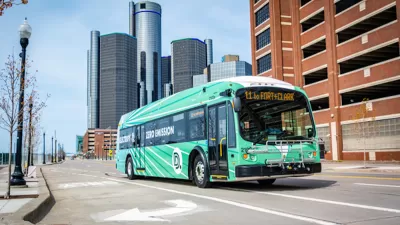Diana Lind of Next City poses five ways big cities can alleviate some of their pension funding problems.
At a recent Penn Institute for Urban Research event, "Urban Fiscal Stability and Public Pensions: Sustainability Going Forward," pension funding experts discussed some of the issues facing cities as more Baby Boomers begin retiring. According to Diana Lind of Next City, "The pension problem extends far beyond Detroit, to the United States’ largest cities: New York, Los Angeles and Philadelphia all have unfunded liabilities, while Chicago’s pensions are just 50 percent funded. Ballooning pension costs are trouble for city governments, retirees and, perhaps most of all, taxpayers, as infrastructure, schools and other needs are simply put off while the city pays for pensions, benefits and interest."
Among the five ideas Lind notes, one is taken from Stanford professor Joshua Rauh. At the event, Rauh suggested that "payouts should be linked to how well a retirement fund delivers. He noted that the S&P 500 went up by 75 percent between 2009 and 2013. Yet after studying 10 cities, he found that even though pensions are heavily invested in stocks, six of the 10 cities saw their unfunded liabilities fall by just an average of 16 percent; meanwhile in four cities, including New York and Philadelphia, these liabilities actually increased. This anecdote demonstrates the magnitude of the pension problem: Liabilities can grow faster than cancer and can’t easily be put into remission."
Other ideas are rooted in electing politicians to address the pension problem, suing actuaries for faulty analysis of a city's liabilities (as Detroit has down), constantly consulting with authoritative experts, and creating a "shared gain" pay-in approach.
FULL STORY: 5 Answers to the Money Problem Every Big City Has

Planetizen Federal Action Tracker
A weekly monitor of how Trump’s orders and actions are impacting planners and planning in America.

Restaurant Patios Were a Pandemic Win — Why Were They so Hard to Keep?
Social distancing requirements and changes in travel patterns prompted cities to pilot new uses for street and sidewalk space. Then it got complicated.

Map: Where Senate Republicans Want to Sell Your Public Lands
For public land advocates, the Senate Republicans’ proposal to sell millions of acres of public land in the West is “the biggest fight of their careers.”

Maui's Vacation Rental Debate Turns Ugly
Verbal attacks, misinformation campaigns and fistfights plague a high-stakes debate to convert thousands of vacation rentals into long-term housing.

San Francisco Suspends Traffic Calming Amidst Record Deaths
Citing “a challenging fiscal landscape,” the city will cease the program on the heels of 42 traffic deaths, including 24 pedestrians.

California Homeless Arrests, Citations Spike After Ruling
An investigation reveals that anti-homeless actions increased up to 500% after Grants Pass v. Johnson — even in cities claiming no policy change.
Urban Design for Planners 1: Software Tools
This six-course series explores essential urban design concepts using open source software and equips planners with the tools they need to participate fully in the urban design process.
Planning for Universal Design
Learn the tools for implementing Universal Design in planning regulations.
Heyer Gruel & Associates PA
JM Goldson LLC
Custer County Colorado
City of Camden Redevelopment Agency
City of Astoria
Transportation Research & Education Center (TREC) at Portland State University
Camden Redevelopment Agency
City of Claremont
Municipality of Princeton (NJ)





























